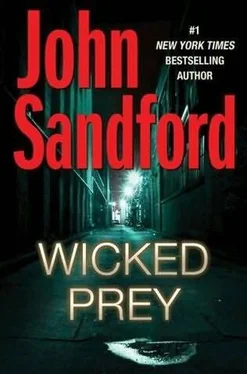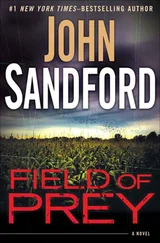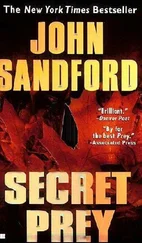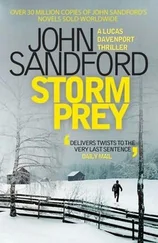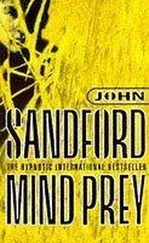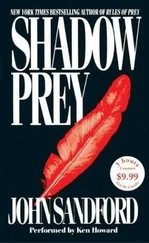Cohn looked at the door for a long five seconds, then said, "Back to Hudson." He glanced at his watch, leaned back in the passenger seat, laced his fingers across his chest and closed his eyes. "Check the layout one last time. I want to see the emergency car. Then, do it."
"You know what worries me the most?" Cruz asked. "What worries me is that the guy might not be there-you know, he goes out for a drink or something. Then you'll have to make some decisions right on the spot. Whether to wait or go, and if you go, whether to come back."
"You said there's always somebody with the money," Cohn said.
"That's what I was told," Cruz said. "There's always somebody with the money, until it's gone."
***
They called Lane and McCall, got them started back. At the motel in Hudson, Cohn got a cup of coffee, and then they began working over the drawings of the hotel's interior. "Don't want to meet a busboy carrying food up there," McCall said.
Cruz said, tapping the drawing, "They use the staff elevator, over around the corner, here. That stairway is mostly a fire escape. I walked it up and down, there's concrete dust on the treads, like it hardly gets used at all."
"Two weeks ago," Lane said.
"Nothing's perfect," Cruz snapped.
"Just sayin'," McCall said.
***
They talked about the uncertainties. As a unit, they'd always focused on scheduled money deliveries-ATM restockings, armored cars, credit unions in southern auto-factory towns, which carried heavy cash on paydays.
Of them all, they liked the armored cars the best, because they offered a choice of attack points, and if you found the right armored car, at the right spot, you were guaranteed a major payoff and a slow reaction by the cops. None of them had ever gone after individuals, for the simple reason that individuals didn't carry enough cash. If you're looking at the possibility of years in prison, then the payoff should be worth the risk, they all agreed.
With the earlier targets, the certainties were large. If the armored car wasn't at point X, and if the local cop cruiser wasn't at point y, then you rescheduled. Credit unions didn't move, and they always opened at the same time, and closed at the same time. If the factory passed out the checks at 10 a.m., then the first guys wouldn't sneak out to cash them before 10:05. Therefore, you had the hour between 9 a.m. and 10:05 to hit the place '
With this job, they weren't even certain that the money would be there. Cruz said it would be-ninety percent, anyway-but still: with this job, the uncertainties were larger than usual.
***
"The first guy, John Wilson, he's a little guy, but he's got a temper," Cruz told them. "He could give you some trouble. That's the way it is. There may be one or two other guys in the room with him. If there isn't anyone else there, handle it however you want. If there is, you crush him. McCall-use your pistol. Beat him up, get him on the floor, kick his head, kick his balls. Don't kill him, but hurt him. The thing is, downstream, the word is going to start getting out about these guys. If the later targets hear about it, they'll get worried. We need them scared. We need them backing away from us. Makes everything easier."
"What if they get security?"
"They won't. They can't have anyone else around when they're passing out the cash. What they're doing is a crime."
"But'"
"If they do get a guy with a gun, you'll have to deal with it. But they won't: that's the beauty of the whole thing. The cops finding out what they're doing is worse than getting beat up and robbed. Now, the room. I couldn't get into all the rooms, but I got into a few. I believe he'll have a sitting room with a bedroom off to your right as you go in…"
***
Cruz was about to go on, but there was a knock at the door. She froze. There was a "Do Not Disturb" sign on the doorknob.
"They're not using a key to knock," she blurted. "It's not the hotel."
"Answer the door," Cohn told Lane. He'd been lying on the bed, now was on his feet.
Lane went to the door, opened it just a crack, said, "Shoot," and opened it wide. A young blond woman carrying an old-style hard makeup case stepped through, spotted Cohn, cried, "Brutus," and threw herself at him. He picked her up, her legs wrapped around his waist. Cruz shouted at him, as Lane closed the door, "You fucker. You fucker, Brute. Goddamn you…"
"How are you, Lindy?" Lane asked, and to McCall, he said, "It's Lindy."
"I'm outa here," Cruz said.
"Rosie, calm down, okay?" Cohn said, over Lindy's shoulder.
Lindy said, "Yeah, calm down, Rosie. Jesus Christ."
"Lindy's just visiting. I'll put her on the plane home in a few days," Cohn said.
Cruz put her hands, in fists, on her hips, her face a hard clutch of anger: "Why the hell'"
"Because I couldn't wait," Cohn said. "That's why."
"Brute…"
"Y'all get out of here, back in an hour," Cohn said, "or we're all gonna be pretty embarrassed."
They shuffled out, Cruz running her hands through her short hair in exasperation, and Cohn said, "Better make it two hours."
***
Saturday on the sloping front lawn of the state Capitol, in St. Paul.
Letty strolled through the crowd, protesters, rubberneckers, street people, vendors, cops, taking it all in. She was a teenager, one toe in senior high, but for two years she'd worked unofficially for Channel Three, an unpd intern. She was sponsored there by one of Lucas's ex-girlfriends-a girlfriend with whom he'd had a daughter, who now lived with her mother and her mother's new family.
Letty occasionally thought about how tangled it all was-women having children with two different men, men having children with several different women, and she was about to become the official daughter of the only husband and wife who'd ever behaved like parents with her '
Letty had been born in the bleakest part of northwest Minnesota, the daughter of an alcoholic mother; her father took off when she was a child, and she hadn't seen him since. They'd lived in an old farmhouse outside a small country town, so she hadn't even had the benefit of close-by neighbors. They had no satellite TV, so there'd been only two weak over-the-air TV channels, and she'd grown up as a county library patron, and a reader.
When she got into school, she'd encountered a man who made his living wandering through the local marshlands in the late fall and winter, trapping fur. He'd taught her how to do it-not much to learn, you could get most of it in a few days of observation-and she'd become a trapper, taking muskrats out of the marshes and raccoons out of the county landfill. That had gone on for most of her elementary school days; she'd taught herself to drive at the same time, and how to avoid the local highway patrolmen. The money from the trapping had become the family's main source of income.
A tough kid.
A series of murders had torn up her life: had resulted in her mother's death, and had brought Lucas Davenport and Del Capslock into town. She and Lucas had hit it off almost immediately, and he'd brought her home as his legal ward.
Cinderella.
Her job with Channel Three was more than decorative. Lucas's cop pals kept her well-stocked with tips, and since they were always reported by other producers and reporters, her favored reporters did very well with her.
A woman with a baby, sitting outside a tiny orange nylon tent, smiled at her and Letty smiled back and said, "Hello, there."
"You can't really be a TV person," the woman said, looking at the credential tags around Letty's neck.
"But I am," Letty said happily.
Across the park, in the street, a white van cruised by, the side door open, and a man in a wheelchair looking out at the park-and at her, Letty thought. Just a spark, an impression, their eyes clicking, and then he was gone.
Читать дальше
